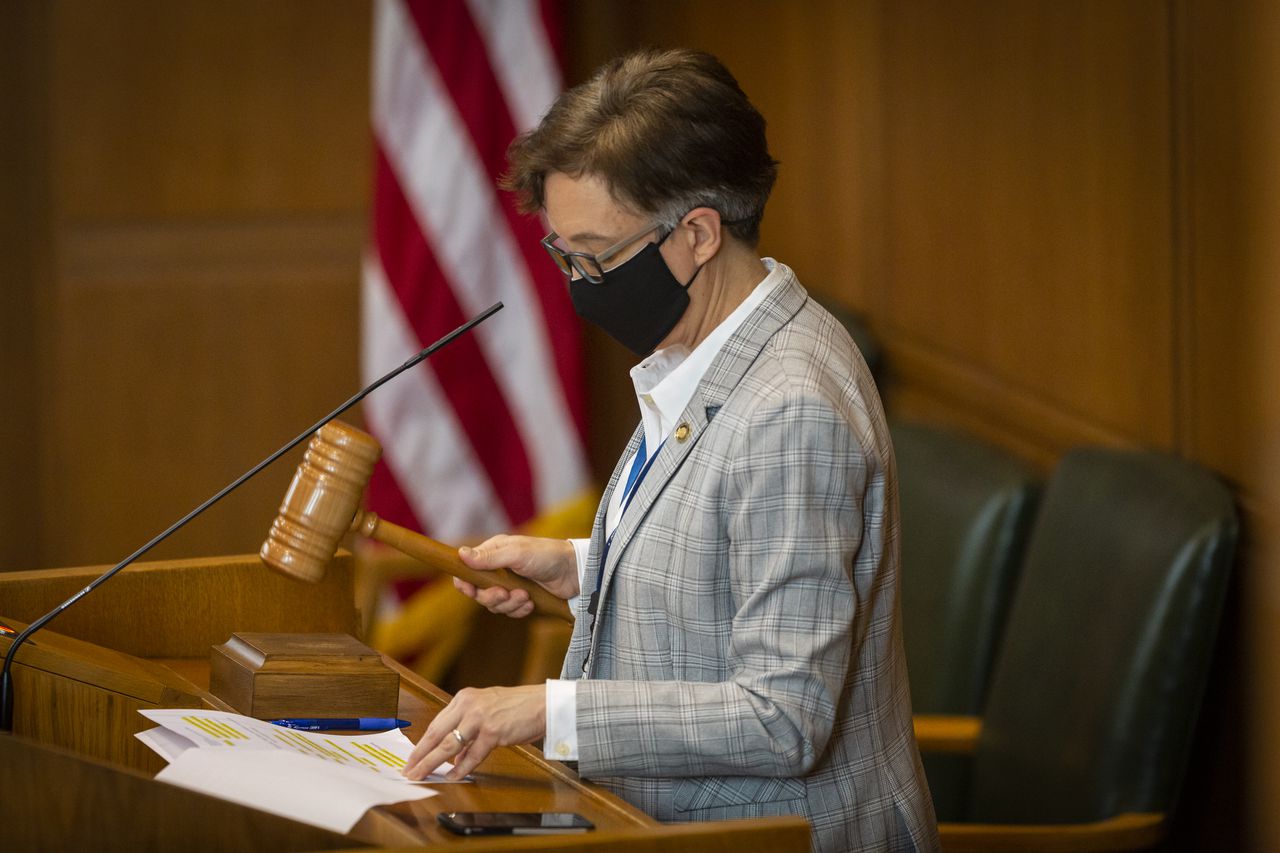With less than three weeks left in 2020, Oregon Gov. Kate Brown and top lawmakers are still negotiating a potential third special session to extend the state’s eviction moratorium and help landlords whose tenants have fallen behind on rent.
House Speaker Tina Kotek and other members of her caucus also have another priority for a special session: repealing three new state tax breaks, including one that would largely benefit the top 1% of Oregon earners.
State lawmakers have increasingly raised concerns about income inequality in recent months, as they heard from desperate Oregonians who lost jobs or income due to the pandemic and quickly exhausted $500 state payouts.
One of the larger tax cuts comes from eliminating a previous $500,000 cap for joint filers on the amount of business losses taxpayers can deduct from other earnings, such as a spouse’s wages or capital gains from selling stocks. It could save those taxpayers, who also include single filers with more than $250,000 in wages or other earnings, $47.8 million and cost the state that same amount in lost tax revenue in the current biennium, according to an estimate from the Legislative Revenue Office.
Less than 1% of Oregon income tax filers had adjusted gross incomes above $500,000 in 2017, the latest data available from the state Department of Revenue. The top 3% of Oregon tax filers had incomes of at least $250,000.
A spokesperson for Kotek, a Democrat from Portland, wrote in an email Friday afternoon that the speaker does not believe there would be enough public benefit to justify keeping that and other tax cuts, which were included in the federal coronavirus relief law known as the CARES Act and will automatically be copied into Oregon tax code unless lawmakers vote to “disconnect” from the federal policy.
“Speaker Kotek believes the impact of the CARES Act tax changes on state revenue weren’t worth it for Oregon,” communications director Danny Moran wrote in an email.
If lawmakers don’t vote in 2020 to buck the federal action, the tax cut will be the law in Oregon for tax year 2020. However, a vote in the 2021 regular session to disconnect from federal tax code could be done retroactively to apply to 2020 according to Kotek’s staff and Legislative Revenue Officer Chris Allanach, who said legislative lawyers confirmed the legality. Allanach wrote in an email that legislative staff still need to work with the Department of Revenue to sort out how the state would administer such a change.
Moran wrote, “It’s pretty clear we have to discuss it in 2021, if not in a special session this month.”
In her budget blueprint for 2021-2023 released earlier this month, Brown proposed eliminating the three tax breaks but suggested doing so starting in 2021, when the hit to state tax revenues is expected to taper.
A spokesperson for the governor did not respond to questions late Friday afternoon about whether Brown supports Kotek’s push to eliminate the tax breaks this year or if she sees any benefit to keeping the new tax cuts for now. Senate President Peter Courtney also declined to comment. Republican leaders in the House and Senate similarly did not respond to questions from The Oregonian/OregonLive.
One of the three new federal tax breaks that would be automatically copied into Oregon law absent lawmaker action would allow businesses with at least $25 million in annual revenue to deduct more interest from their tax bills. A third provision copied from the CARES Act allows businesses to carry net operating losses back to each of the five years preceding the loss and eliminates an 80% of taxable income cap on the losses. If businesses file amended returns, that could result in refunds, The Oregonian/OregonLive has reported.
Together, the three new tax cuts could reduce state tax revenues by $102.9 million in the current two-year budget, according to an estimate from the Legislative Revenue Office this week. That’s down from $225 million projected earlier this year, largely because Oregon’s economy was not pummeled as badly as expected earlier this year, economists wrote.
The Legislature, which is controlled by Democrats, opted not to consider a bill to repeal the new tax breaks during the second special session in August, after business people and others from around the state sent in more than 150 mostly copycat emails urging lawmakers to leave the cuts in place. At least four other states — New York, North Carolina, Georgia and Colorado — that are similarly connected to federal tax code disconnected from tax breaks in the CARES Act by August, according to the left-leaning policy group Tax Fairness Oregon.
Nationally, the congressional Joint Committee on Taxation has estimated 90% of the benefit from the tax savings would go to people with annual incomes of at least $1 million.
Jody Wiser of Tax Fairness Oregon said the tax cut on wages is particularly egregious and would not equally benefit business owners.
“It only does you good if a couple has more than a half million dollars wage income,” Wiser said. “So if a restaurant owner has a wife who stayed home with the kids, they don’t get any benefit.” But a restaurant owner whose wife is a doctor and earns more than $500,000 could reap tax benefits. “We’ll never know who gets it,” Wiser said.
Sandra McDonough, president of Oregon Business & Industry, said the state’s largest business lobbying organization opposes any move to undo the tax cuts. Lawmakers and the governor should cut state spending, rather than raise taxes. “They don’t need it,” McDonough said of the tax revenue. She pointed to a study her group funded earlier this year that found Oregon’s business taxes, which have ranked among the lowest in the nation for years, are rising substantially over several years due to changes voters and policymakers enacted in recent years.
“This is money businesses can keep in their pockets after a really hard year,” McDonough said of the new tax cuts.
— Hillary Borrud; [email protected]; @hborrud
Subscribe to Oregonian/OregonLive newsletters and podcasts for the latest news and top stories.
















